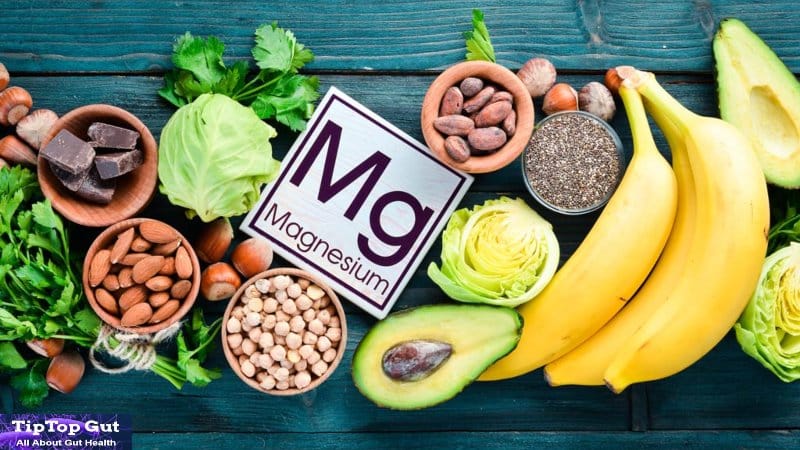Magnesium is the fourth most abundant mineral in your body. It’s involved in many essential functions, including muscle contractions, blood pressure regulation, and blood sugar control.
Although it’s found in numerous foods — like vegetables, whole grains, nuts, and beans — observational studies show that most Americans don’t get adequate amounts from their diets.
Here, we’re going to discuss what is the best magnesium for gut health. Let’s fist explore what is magnesium and then continue with magnesium and gut health.
What is Magnesium?
Magnesium is an essential mineral, involved in several processes in the body including blood sugar control, muscle function, nerve messaging, and protein production.
According to the National Institutes of Health, magnesium is an essential mineral your body requires to regulate everything, from your muscles and nervous system to energy production, blood sugar, and blood pressure. Adults need between 300 to 400 mg (mg) of magnesium daily. This is mainly due to what we eat. Foods such as cooked beans, cashews, almonds, bananas, green leafy vegetables, brown rice, whole grains, and fortified foods have high magnesium levels. You may not get as much magnesium as you think.
This is confirmed by a 2017 Scientific Study which shows that around two-thirds (or hypomagnesemia) of Westerners are likely to be deficient in magnesium. While most people can handle a short-term magnesium deficiency, you might experience long-term symptoms like:
- Appetite loss
- Nausea or vomiting
- Fatigue and muscle weakness
- Muscle cramps
- Heart arrhythmia
- Tingling or numbness
Certain health conditions such as Crohn’s disease, celiac disease, and Type 2 diabetes put people at greater risk of becoming magnesium deficient. People who take certain medications (such as chemotherapy drugs, antibiotics, and proton pump inhibitors) are also at increased risk.
Magnesium and Gut Health
Research has shown that magnesium is beneficial for gut health.
Gut health refers to two aspects that make up a healthy gastrointestinal system. The first is digestive health. Healthy GI tracts mean better digestion.
Enzymes are enzymes in the digestive system that break down food into nutrients and waste.
These enzymes can lead to irritable bowel syndrome and inflammatory colitis if they aren’t in sufficient amounts. Another essential function of the gut is to house many beneficial bacteria. This is called the gut microbiome.
Amazingly, there are 40 trillion good bacteria in the human body. Most of them are found along the length of our intestinal tract.
This so-called “intestinal balance” can lead to an array of autoimmune diseases, such as Crohn’s. Chronic inflammation of the bowels.
As we mentioned, magnesium plays an important role in over 300 enzymatic reactions in the body. Many of these processes help break down food, which enters the body at different points during digestion.
Low magnesium levels can lead to new or worsening existing digestive problems. Most people believe that probiotics and fermented foods containing live cultures are the best ways to increase the good bacteria in the intestinal microbiome.
These are believed to be beneficial, but ensuring your body has sufficient nutrients and minerals is important. One study has shown that magnesium deficiencies can cause the growth of bacteria in the gut.

Read More:
60 Best Foods for Gut Health and Digestion: The Best Guide You Ever Need!
Are You Serious about Your Gut Health?
It is important to note that the daily recommended magnesium intake is very high, and most people don’t get enough.
If you suffer from a digestive problem (such as colitis, Crohn’s disease, or irritable bowel syndrome), your symptoms might improve by increasing your magnesium intake daily.
Magnesium, the fourth most common mineral in the human body, is vital for good health. Magnesium involves more than 300 cellular processes, including protein synthesis and ATP usage. Research has shown that not many people are consuming enough magnesium.
Although you may not know it, at least 70% of your immune systems can be found within your gut. There, beneficial bacteria work to keep your body healthy and balanced. It can cause problems in your overall health, and your ability to maintain a healthy digestive system should be a priority.
Supporting your overall health and wellness is possible by taking care of your gut. Probiotics can replenish the microbes in your gut and promote overall health and balance.
Three primary digestive enzymes are responsible for converting food into nutrients the body can absorb. Magnesium is involved in many enzyme systems throughout the body. These include energy production from protein, carbohydrate, and fat metabolism.
Best Magnesium for Gut Health: 4 Best Magnesium Types for Digestive Health
As explained earlier, Magnesium is a vital nutrient that supports a number of body functions. Here, you’re going to explore 4 best magnesium for gut health. These 4 types of magnesium are the most beneficial for gut and digestive health than other types of magnesium.
1. Magnesium Glycinate
Let me start with magnesium glycinate, my favorite form of magnesium. This is magnesium combined with the amino acid and glycine. Glycinate absorbs more effectively and is less likely to cause stomach upset.
Magnesium glycinate is easily absorbed and may have calming properties. It may help reduce anxiety, depression, stress, and insomnia. Magnesium glycinate has been known to have a unique ability to impact our neurological health. Research shows that taking 150-300 mg of magnesium glutinate (or a mixture with magnesium taurinate) a few times daily can improve memory loss, anxiety, depression, and mood swings. It is not clear what the mechanism of action might be. One theory is that magnesium-deficient people may be more susceptible to mental health problems. But, magnesium blood tests do not support this hypothesis. Research suggests magnesium deficiency symptoms may appear before the blood tests are done.
A magnesium glycinate is better if you’re looking for the best magnesium option for your needs. You may also get some anti-inflammatory support with the glycinate version.
2. Magnesium Citrate
Some research suggests that this type is among the most bioavailable forms of magnesium, meaning that it’s more easily absorbed in your digestive tract than other forms.
It’s typically taken orally to replenish low magnesium levels. Due to its natural laxative effect, it’s also sometimes used at higher doses to treat constipation.
Magnesium citrate is second because it’s more affordable, absorbs well, and helps loosen stool if you desire that effect. This is the best choice if you have occasional constipation. Magnesium citrate powder is my preferred choice because it will promote regular bowel movements.
Magnesium has been shown to be an effective treatment for occasional constipation. In particular, magnesium citrate, sulfite, and hydroxide all have an osmotic laxative effect. This means that these supplements help relax your bowels and draw water into your intestines to soften stool and make it easier to pass.
Magnesium citrate might have a calming effect, but not as much as magnesium glycinate. You may still find magnesium citrate products that are advertised as relaxing.
Magnesium citrate has been used to prevent migraines for the first time. Research has shown that 600 mg is sufficient to prevent some migraines. Talking to your doctor is a good idea before taking a more serious supplement such as magnesium citrate. Magnesium citrate can cause digestive discomfort and is difficult to tolerate.
Attention is needed to know that too much magnesium can cause an imbalance in Calcium levels. You may find magnesium supplements with a small amount of added calcium to balance it. This may be more appropriate for those who take higher amounts of magnesium.
Lastly, magnesium citrate is also being studied for PMS management. Some research shows a slight reduction in PMS symptoms when oral magnesium citrate is taken. During menstruation, women’s calcium and magnesium levels can fluctuate. Researchers believe magnesium levels can drop or become low during the premenstrual period.
3. Magnesium Oxide
Magnesium oxide is a salt that combines magnesium and oxygen. It naturally forms a white, powdery substance and may be sold in powder or capsule form. This type isn’t typically used to prevent or treat magnesium deficiencies, as some studies report that it’s poorly absorbed by your digestive tract.
Instead, it’s more frequently used for short-term relief of uncomfortable digestive symptoms, such as heartburn, indigestion, and constipation. It may also be used to treat and prevent migraines.
Magnesium oxide is not bioavailable (absorbs poorly), so you might need to take a higher dose. You may experience side effects such as diarrhea if you increase the dosage.
Magnesium oxide is not my favorite choice because it absorbs more than glycinate or citrate. Magnesium oxide, the most commonly found form of magnesium in grocery stores, is the most cost-effective form. You can often find it on tablets.
Magnesium oxide is often used to relieve digestive complaints like heartburn and constipation. Given that the body doesn’t absorb it well, it isn’t a good choice for those who need to raise their magnesium levels.
4. Magnesium Carbonate
Magnesium carbonate is worth mentioning as it’s a popular choice for clients and myself. Magnesium chloride is converted to magnesium carbonate in the stomach. This supplement may provide stomach-soothing antacid benefits. Magnesium carbonate powder that you can mix with water is my preference.
When magnesium carbonate and citric acid are combined in water, they form magnesium citrate. You may find powder magnesium carbonate forms with citric acid listed in the ingredients. Your drink will bubble up and fizz when water is added. This chemical reaction takes place. Your drink will become magnesium citrate in a matter of minutes. Consume the drink while it is still fizzy if you want to settle your stomach. You can get more absorbable citrate by letting the bubbles settle before you drink it.
I love magnesium carbonate with citric acid. It is a great option that is both enjoyable to drink and gives me a pleasant feeling in my stomach.
Read More:
Best Over the Counter Probiotic for Gut Health: Easy Guide 2022
Other Types of Magnesium
Besides the above-mentioned 4 types of magnesium, there are many other magnesium types that are beneficial for your overall health. The below-stated types of magnesium may not directly support your gut health but indirectly support your gut health by offering benefits to your overall health.
1. Magnesium Chloride
Most commonly sold as a tablet, this combination of magnesium and chloride mimics a natural pairing that occurs in seawater. It’s most typically used by people who have a magnesium deficiency and are generally looking to boost their magnesium levels.
2. Magnesium Malate
Another magnesium salt, magnesium malate combined with malic acid, this form of magnesium is typically used to treat neuromuscular system conditions, including fibromyalgia and chronic fatigue. The formula is also particularly easy for the body to absorb, making it a beneficial magnesium supplement for many people. Research suggests that magnesium malate is very well absorbed in your digestive tract, making it a great option for replenishing your magnesium levels.
3. Magnesium Sulfate
You’re likely more familiar with this form of magnesium’s brand name: Epsom salt. Combining the mineral with sulfur and oxygen, the final product can have a number of beneficial effects on the muscles, relieving soreness and inducing stress release. When taken orally, this form of magnesium can also help with constipation.
4. Magnesium Lactate
Magnesium lactate is the salt formed when magnesium binds with lactic acid. Magnesium lactate is utilized as a food additive to regulate acidity and fortify foods and beverages. It’s less popular as an over-the-counter dietary supplement. Magnesium lactate is easily absorbed and may be a little gentler on your digestive system than other types. This is particularly significant for people who need to take large doses of magnesium regularly or don’t easily tolerate other forms.
5. Magnesium Taurate
Magnesium taurate contains the amino acid taurine. Research suggests that adequate intakes of taurine and magnesium play a role in regulating blood sugar. Thus, this particular form may promote healthy blood sugar levels. Magnesium and taurine also support healthy blood pressure. A recent animal study revealed that magnesium taurate significantly reduced blood pressure in rats with high levels, indicating that this form may bolster heart health.
6. Magnesium L-threonate
Magnesium L-threonate is the salt formed from mixing magnesium and threonic acid, a water-soluble substance derived from the metabolic breakdown of vitamin C. This form is easily absorbed. Animal research notes that it may be the most effective type for increasing magnesium concentrations in brain cells. Magnesium L-threonate is often used for its potential brain benefits and may help manage certain brain disorders, such as depression and age-related memory loss. Nonetheless, more research is needed.
7. Magnesium Orotate
Magnesium orotate includes orotic acid, a natural substance involved in your body’s construction of genetic material, including DNA. It’s easily absorbed and doesn’t have the strong laxative effects characteristic of other forms. Early research suggests that it may promote heart health due to orotic acid’s unique role in the energy production pathways in your heart and blood vessel tissue.
8. Magnesium Aspartate
This form of magnesium is found in many bodybuilding powders and supplements. It’s a combination of both the magnesium molecule and the amino acid aspartate. Aspartate alone can be an excitatory neurotransmitter and high doses may cause neuronal damage (i.e. it’s excitotoxic). Magnesium aspartate is a very cheap filler form of magnesium and should be avoided by those with magnesium deficiencies.
9. Magnesium Chelate
Magnesium chelate simply refers to magnesium that has been bound to an amino acid so the body can better absorb it. ‘Chelated’ mineral supplements are often touted for their improved absorption.

Image Credits: DrJockers.com
Recommended Dosage of Magnesium for Optimum Results
The recommended dose for magnesium varies, depending on the intended use, and how much of this mineral you’re already getting in your diet.
Here are the current average daily recommended amounts of magnesium for teens and adults:
| Life stage | Recommended amount |
| Teen boys (14–18 years old) | 410 mg |
| Teen girls (14–18 years old) | 360 mg |
| Men (18+ years old) | 400–420 mg |
| Women (18+ years old) | 310–320 mg |
| Pregnancy (14–18 years old) | 400 mg |
| Pregnant people (18+ years old) | 350–360 mg |
| Breastfeeding (14–18 years old) | 360 mg |
| Breastfeeding or chestfeeding (18+ years old) | 310–320 mg |
To avoid potential side effects, such as diarrhea, nausea, and stomach cramps, try to keep your intake of magnesium from supplements under 350 mg per day, unless you’re under the supervision of a healthcare professional.
Magnesium Absorption
Absorption is a separate concern. Magnesium itself is reasonably poorly absorbed (35% absorbed in the worst case scenario and 45% absorbed in the best). Generally if you are magnesium-depleted then your body will absorb any magnesium better than it would otherwise.
Calcium and magnesium compete for absorption, so if you take calcium and magnesium together they will both compete with each other (meaning you will absorb less of each). Also high or low protein intake can reduce magnesium intake as well as phytates from some vegetables. Generally if you’re taking a magnesium supplement it’s best on an empty stomach.
Magnesium also absorbs well through the skin (potentially far better than through the digestive tract), so Epsom salt baths (magnesium sulphate) and magnesium lotions, gels or oils (usually magnesium chloride) can be a great way to increase your body stores. Topical forms can be best if you’re using magnesium for it’s muscle relaxation and calming properties.
Orally, magnesium citrate is the best absorbed form (but it’s bonded to a big molecule so there is a smaller amount of magnesium by weight). Mg oxide is the most poorly absorbed form but has the highest Mg per weight, so actually you may get more elemental magnesium out of the same dose of Mg oxide vs. another magnesium, simply because of the size. The other forms of magnesium are somewhere in the middle in terms of absorption.
Frequently Asked Questions about the Best Magnesium for Gut Health
What is the most effective form of magnesium for Gut Health?
The best form of magnesium to take depends on the desired benefit. For example, research indicates that the following 4 types of magnesium are the most effective for gut health and treating constipation:
- Magnesium Glycinate
- Magnesium Citrate
- Magnesium Oxide
- Magnesium Carbonate
What are the benefits of magnesium?
Magnesium is one of the most plentiful and essential minerals in the body. The common compound helps with more than 600 bodily functions but is particularly helpful when it comes to: Boosting your energy and mood. Supporting blood sugar. Relaxing sore muscles. Relieving constipation. Increasing quality sleep.
What are the signs of a magnesium deficiency?
Magnesium deficiencies are rare but may be linked to several external conditions, including alcoholism and taking certain medications.
Signs of a magnesium deficiency include:
- Loss of appetite.
- Nausea or vomiting.
- Muscle spasms.
- Fatigue or weakness.
- A feeling of pins and needles.
- Abnormal heart rhythms.
If left unchecked, low magnesium levels can contribute to a number of detrimental health effects, such as:
- Heart disease
- High blood pressure
- Migraines
- Osteoporosis
- Diabetes.
When is the best time to take magnesium?
Magnesium can be safely taken at any time of day. However, it’s recommended to take a magnesium supplement with food or on a full stomach to avoid potential side effects like nausea, vomiting, or diarrhea.
How exactly does magnesium help with digestion?
During digestion, three primary digestive enzymes turn food into nutrients that can be absorbed and assimilated by the body. Magnesium plays a role in numerous enzymes systems throughout the body. A few of these processes include energy production from protein, carbohydrate, and fat metabolism.
How much magnesium is safe to take?
The total recommended daily amount of magnesium is 400–420 mg for men and 320–360 mg for women. Keep in mind, this number is for all dietary sources of magnesium, including from food sources and supplements.
The upper limit for magnesium from supplements specifically is 350 mg.
Are there side effects of taking magnesium?
Magnesium supplements can cause some digestive issues, including nausea, stomach cramping, and diarrhea, especially when taken at higher doses. Additionally, certain individuals, such as those with kidney conditions, can be more susceptible to side effects.
Read More:
Best Bread for Gut Health: 7 Healthiest Breads
Best Sweetener for Gut Health: 11 Best Sugar Substitutes for A Healthy Gut
Best Probiotic for Gut Health and Weight Loss: An Ultimate Guide 2022
Best Probiotic for Vaginal and Gut Health: The Best Guide 2022
Scientific Studies and References
-
Schwalfenberg GK, Genuis SJ. The Importance of Magnesium in Clinical Healthcare. Scientifica (Cairo). 2017;2017:4179326. doi: 10.1155/2017/4179326. Epub 2017 Sep 28. PMID: 29093983; PMCID: PMC5637834.
- Harvard School of Public Health
- Ying Huang, Xian Huang, Ling Zhang, Fang Han, Ke-Liang Pang, Xue Li, Jian-Ying Shen. Magnesium boosts the memory restorative effect of environmental enrichment in Alzheimer’s disease mice. CNS Neuroscience & Therapeutics. 2018 Jan;24(1):70-79.
https://pubmed.ncbi.nlm.nih.gov/29125684/ - WebMD
- Schwalfenberg GK, Genuis SJ. The Importance of Magnesium in Clinical Healthcare. Scientifica (Cairo). 2017;2017:4179326. doi: 10.1155/2017/4179326. Epub 2017 Sep 28. PMID: 29093983; PMCID: PMC5637834.
- Healthline
- MedicalNewsToday
- MayoClinic

















